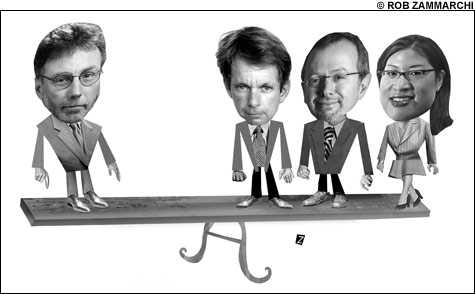
IN THE WORKS: The Globe is reportedly poised to unveil a redesigned front page in the next few weeks — another chance for front-page-enterprise editor Caleb Solomon to make his mark on the paper. |
To grasp the significance of the latest shake-up at the Boston Globe, consider this: the trio that just received key promotions — Brian McGrory, Caleb Solomon, and Shirley Leung — all spurned overtures from elsewhere.
McGrory declined the editorship of Boston magazine last year; this month, he gave up his metro column to become metro editor. Solomon had a chance to become Bloomberg News’s Boston-bureau chief; instead, he has a new job directing front-page enterprise coverage. And Leung, one of Solomon’s deputies, reportedly passed on opportunities at the New York Times and the Wall Street Journal to run the business section.
It hasn’t always worked this way. The Globe has seen a number of talented editorial staffers leave since the 2001 arrival of editor Marty Baron, who was hired from outside the paper: some quit the business, some got better jobs elsewhere, and some were pushed out. Whatever their individual strengths and flaws, their exits (which were accompanied by several rounds of buyouts) compromised the paper’s institutional memory. And they raised fears that the Globe — like the newspaper industry at large — was fading away.
Even more than the Globe’s recent Pulitzer, these three promotions signal the arrival (temporarily, at least) of some much-needed newsroom equilibrium. They also send a strong message about the Morrissey Boulevard status quo. Forget former editors Matt Storin and Tom Winship. Today’s Globe is very much Baron’s paper, both in terms of staff and sensibility.
Sizing ’em up
Taken in isolation, Leung’s promotion has the fewest subtexts of the three. At 34, Leung already has a potent résumé that includes reporting stints at the Globe, the Wall Street Journal, and the Baltimore Sun. Globe management was impressed by both her editing savvy and her energy: Solomon calls her a “whirlwind news-breaking machine.” Her plans for the section? Leung tells the Phoenix she’ll augment coverage of residential real estate, financial services, and nonprofits, and encourage more investigative work.
The McGrory hire is rifer with meaning. Opinions of his predecessor, Carolyn Ryan, vary markedly. With some exceptions, younger, less experienced staffers are more likely to praise Ryan’s passion and work ethic; older veterans are more likely to question her story selection and management techniques. But based on conversations with several current and former Globe staffers, both groups like the McGrory choice.
“Brian really is a young old-timer at the Globe,” one explains. “He has one foot in the new Globe, but he also has a solid connection to what I’d call the old Globe.”
“He knows Boston,” says another. “And I think people found it really compelling that he was willing to give up a great job as a columnist to do a much harder job with longer hours. I feel like he comes to this with a genuine interest in making the metro section better and boosting morale in the newsroom.”
Critics of McGrory’s column should remember two things. First, he amassed some impressive reporting experience at the Globe before becoming a columnist, covering Greater Boston and the White House and working as a roving national correspondent.